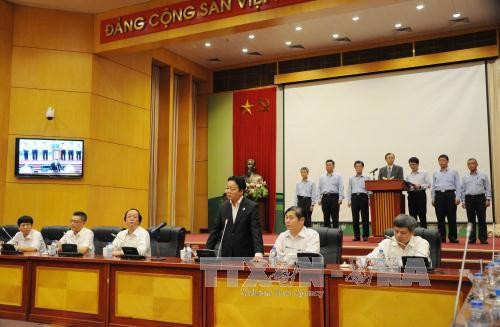(VOVworld) – Minister and Head of the Government Office Mai Tien Dung told a government meeting on June 30 that the Formosa Ha Tinh Steel company released into the sea waste containing phenol, xyanua, and ferrous hydroxide, causing massive fish deaths, in Ha Tinh, Quang Binh, Quang Tri, and Thue Thien-Hue province. Formosa Ha Tinh offered an apology to the Vietnamese people and state and promised to pay 500 million USD in compensation.

Minister of Natural Resources and Environment addresses the meeting which Formosa Ha Tinh Steel admitted their responsibility for the mass fish deaths in 4 central provinces
|
Mr. Dung said the Ministry of Natural Resources and Environment, in collaboration with ministries, agencies and localities, established an interdisciplinary inspection team of 100 Vietnamese and foreign experts and scientists to collect and analyze evidence. They confirmed that a source of waste in the Vung Ang area in Ha Tinh province contained phenol and xyanua which, in combination with ferrous hydroxide, created a compound with a greater density than seawater which flowed from Ha Tinh to Thua Thien-Hue killing marine life en masse.
The Ministry of Natural Resources and Environment investigated the source of the waste and found violations and breakdowns during the construction and pilot operations of Formosa Ha Tinh Steel.
Mr. Dung said Formosa Ha Tinh has admitted responsibility and made 5 promises: “Formosa Ha Tinh has publicly apologized to the Vietnamese government and people for causing the critical marine incident. It agrees to pay 500 million USD to compensate economic losses and completely resolve problems with its waste treatment system. Formosa has pledged to work with Vietnamese ministries, sectors, and central provinces to implement corporate measures to protect the marine environment in the central region and not repeat this violation of Vietnam’s environmental and water resource protection laws. If it ever violates regulations again, it will be punished under Vietnamese law.”
Representatives from the Ministry of Health and the Ministry of Agriculture and Rural Development told reporters that seawater in the four affected provinces is safe, but they will continue to take samples to identify residue levels.